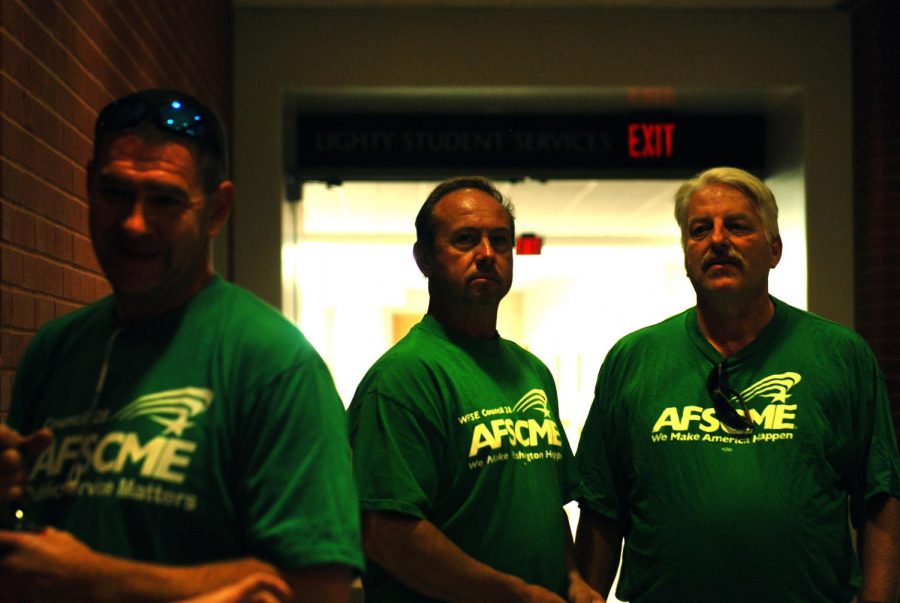University staff lobby for wage increase
Employees affected include electricians, cooks, carpenters
SKYLAR KERSTEN | THE DAILY EVERGREEN
Food service supervisor Eric Needham, right, and other WSU Classified Staff lobby for a wage increase in their 2020-21 contract Monday at the Lighty French Administration Building.
September 10, 2018
A small portion of WSU Classified Staff on campus met Monday in French Administration to lobby President Kirk Schulz for a wage increase.
Schulz, however, was out of the office when the group came.
Classified staff members are mostly employed in Dining Services and Facilities Services, working as cooks, clerks, electricians, painters, carpenters and more. All in all, WSU employs about 350 classified staff, said Eric Needham, a food service worker at Ferdinand’s.
The group, which is represented by the Washington Federation of State Employees, was granted a 2 percent raise for the 2018-19 fiscal year, but workers said this isn’t sufficient to meet the rising cost of living and are negotiating for their 2020-21 contract.
Mark Hamilton is a labor advocate at WFSE who is negotiating on behalf of WSU Classified Staff. He said the price of living, measured by the Consumer Price Index, has increased 19.5 percent since 2008, with state wages only increasing by about 13 percent in the same time period.
Negotiations between WSU and the WFSE have been ongoing the past several weeks with this week beginning the final stages of bargaining.
Michelle Edenso, a retail clerk lead at Flix and Towers markets and the president of the Local 1066 WSFE chapter, said WSU has so far in negotiations refused wage increases.
“Administration kind of slapped us in the face,” Edenso said. “It was insulting what they offered.”
Needham said the majority of classified staff live outside of Pullman because they cannot afford the price of housing. Edenso said rising gas prices put a strain on commuters who then have to pay for expensive parking on campus.
“With what I’m paying in parking, I could buy a side of beef and grow my own garden and live for a year,” Edenso said.
The group hand-delivered about 60 signed postcards to the Office of the President urging Schulz to support them in their efforts for a wage increase.
“The real value of our pay has been eroded by rising costs of health care, transportation, parking, child care and housing,” the letter read.
Schulz, however, was not in the office and the cards were left at the front desk.
The group waited outside the office for several minutes, having received a tip that Schulz was on his way there. Slowly some of the delegation were forced to return to work, many who had used their lunch breaks to attend.
Edenso said maybe Schulz was warned not to come back while they were outside his office.









